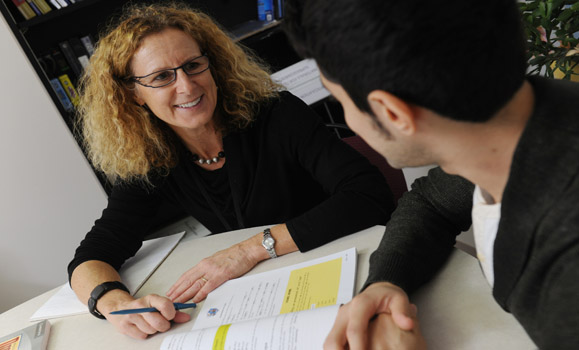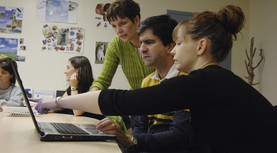Speech鈥慙anguage Pathology (MSc)

The speech-language pathology program at 果酱视频 University involves three years of full-time study allotted to course work, clinical practica, and a research project or thesis. The program leads to a Master of Science (MSc) degree.
Upon completion of the program, students meet the requirements for application for certification by and for licensure in any of the provinces with government regulation of speech-language pathology.
Overview
Speech-Language Pathology curriculum map
- [PDF - 140kb]
- [PDF - 168kb]
- [PDF - 140kb]
Course Sequences
Speech-language pathologists are health care professionals who work with both children and adults to prevent, assess, diagnose and manage (through treatment and counselling) speech, language, voice, and swallowing disorders.
More specifically, speech-language pathologists:
- provide consultative and intervention services for speech and language disorders from infancy to adulthood
- use specialized procedures to assess and diagnose communication and swallowing disorders
- develop and implement treatment plans for language, speech, voice and/or swallowing disorders
- design and employ alternative communication strategies and devices
- counsel clients and families regarding communication and swallowing disorders
- consult with and advise other health professionals听regarding communication听disorders
- consult with educators regarding inclusion, communication, speech and language stimulation and teaching strategies for students with communication disorders
- educate and supervise students
- conduct research aimed at expanding knowledge about processes underlying communication disorders and effective strategies for diagnosis and treatment
Career paths
Speech-language pathologists often work in collaboration with medical and rehabilitation personnel, educators, social workers, psychologists, audiologists and other speech-language pathologists.
Speech-language pathologists work in a variety of environments, including hospitals, community health centres, child development centres, private clinics, schools, rehabilitation centres, and universities.听
Moreover, speech-language pathologists can choose to specialize in assessment and treatment of specific types of communication disorders. Specialization areas can include developmental language, articulation/phonology, voice, fluency, swallowing, or neurogenic speech and language disorders.
Speech-language pathologists enjoy excellent employment opportunities. 果酱视频's speech-language pathology graduates have always been very successful at securing employment soon after graduation.
From a total of 200 professions and jobs, (2014) ranked speech-language pathology in the top 10, based on job prospects and income. Chances of employment are enhanced by the willingness of the candidate to relocate.
Go to the Links Page to obtain more information on communication disorders and the profession of speech-language pathology.
听
Practicum refers to the development of skills through:
- application of academic concepts to the clinical setting;
- observation of clinical activities;
- participation in simulated activities; and
- participation in client care through practicum placements.
Students move through these activities in incremental steps, eventually achieving greater responsibility for the care of clients.
At the end of the first year of the program, students participate in a speech-language and hearing screening program of pre-school children at community pre-schools and other facilities.
During the second year fall and winter terms, practicum placements are arranged within the metro sites, in a public school setting within , at the School of Communication Sciences and Disorders, or at private clinics. Students are responsible for transportation to these placements. In addition to clinical placements, students are required to attend practicum preparation clinical meetings.
During the summer of the second year of the program, students are assigned to facilities on a full-time basis for a 12-week internship within the Atlantic Provinces. One of the options for the internship placement is with the InteRACT program. This placement provides 6-8 students per year with intensive exposure to aphasia rehabilitation in an
interprofessional context.
In the final externship placement in the winter term of the third year, students are placed outside the Halifax area. Students may be placed in sites across Canada. Placements outside of Canada will be considered if appropriate clinical supervision is available.
听
- (formerly Halifax Regional School Board)
To pursue studies in our Master's programs in Speech-Language Pathology, visit the Admissions section of our website.
Program overview
Overview
Speech-Language Pathology curriculum map
- [PDF - 140kb]
- [PDF - 168kb]
- [PDF - 140kb]
Course Sequences
The profession
Speech-language pathologists are health care professionals who work with both children and adults to prevent, assess, diagnose and manage (through treatment and counselling) speech, language, voice, and swallowing disorders.
More specifically, speech-language pathologists:
- provide consultative and intervention services for speech and language disorders from infancy to adulthood
- use specialized procedures to assess and diagnose communication and swallowing disorders
- develop and implement treatment plans for language, speech, voice and/or swallowing disorders
- design and employ alternative communication strategies and devices
- counsel clients and families regarding communication and swallowing disorders
- consult with and advise other health professionals听regarding communication听disorders
- consult with educators regarding inclusion, communication, speech and language stimulation and teaching strategies for students with communication disorders
- educate and supervise students
- conduct research aimed at expanding knowledge about processes underlying communication disorders and effective strategies for diagnosis and treatment
Career paths
Speech-language pathologists often work in collaboration with medical and rehabilitation personnel, educators, social workers, psychologists, audiologists and other speech-language pathologists.
Speech-language pathologists work in a variety of environments, including hospitals, community health centres, child development centres, private clinics, schools, rehabilitation centres, and universities.听
Moreover, speech-language pathologists can choose to specialize in assessment and treatment of specific types of communication disorders. Specialization areas can include developmental language, articulation/phonology, voice, fluency, swallowing, or neurogenic speech and language disorders.
Speech-language pathologists enjoy excellent employment opportunities. 果酱视频's speech-language pathology graduates have always been very successful at securing employment soon after graduation.
From a total of 200 professions and jobs, (2014) ranked speech-language pathology in the top 10, based on job prospects and income. Chances of employment are enhanced by the willingness of the candidate to relocate.
Go to the Links Page to obtain more information on communication disorders and the profession of speech-language pathology.
听
Practicum
Practicum refers to the development of skills through:
- application of academic concepts to the clinical setting;
- observation of clinical activities;
- participation in simulated activities; and
- participation in client care through practicum placements.
Students move through these activities in incremental steps, eventually achieving greater responsibility for the care of clients.
At the end of the first year of the program, students participate in a speech-language and hearing screening program of pre-school children at community pre-schools and other facilities.
During the second year fall and winter terms, practicum placements are arranged within the metro sites, in a public school setting within , at the School of Communication Sciences and Disorders, or at private clinics. Students are responsible for transportation to these placements. In addition to clinical placements, students are required to attend practicum preparation clinical meetings.
During the summer of the second year of the program, students are assigned to facilities on a full-time basis for a 12-week internship within the Atlantic Provinces. One of the options for the internship placement is with the InteRACT program. This placement provides 6-8 students per year with intensive exposure to aphasia rehabilitation in an
interprofessional context.
In the final externship placement in the winter term of the third year, students are placed outside the Halifax area. Students may be placed in sites across Canada. Placements outside of Canada will be considered if appropriate clinical supervision is available.
Links & resources
听
- (formerly Halifax Regional School Board)
Apply
To pursue studies in our Master's programs in Speech-Language Pathology, visit the Admissions section of our website.

